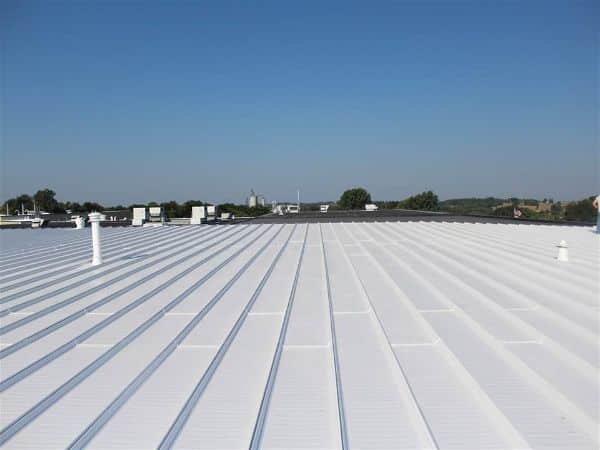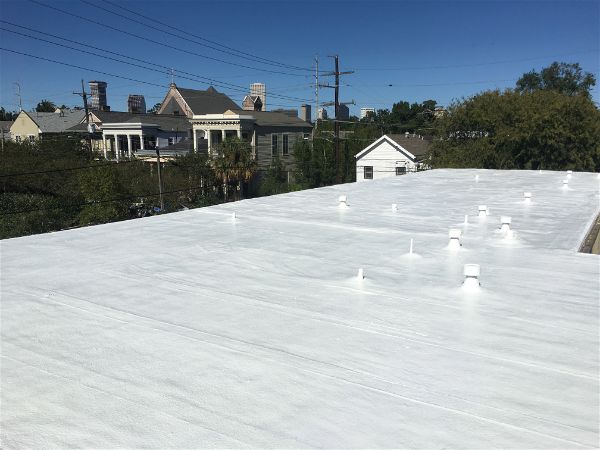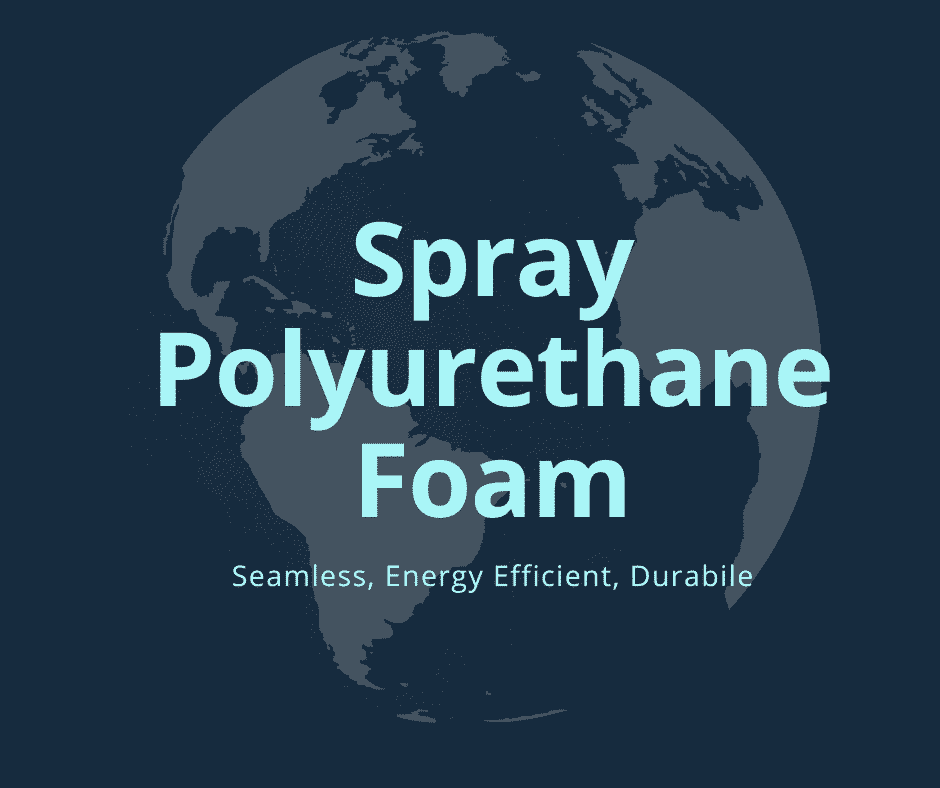Spray Polyurethane Foam
Why Spray Polyurethane Foam is the Best Insulating Product for Your Commercial Roof.
What do athletic shoes, baby bed mattresses, watch straps, bungee cords, and porch cushions have in common? Each is made, at least in part, from the versatile product we know as polyurethane.
Polyurethane has been around since the late 1930s, when Otto Bayer, a German industrial chemist, mixed small volumes of chemical substances together which resulted in polyurethane foam. In 1979 this adaptable product found a new application as building insulation, and then later as a sustainable commercial roofing solution.
Extremely Versatile
Spray polyurethane foam, more commonly referred to as SPF, is a material that is sprayed as a liquid that then expands into a foam, creating a solid layer across an existing roof. SPF is quickly becoming the most popular commercial roofing solution available today. It is an extremely versatile, lightweight material that adheres to a variety of substrates such as wood, concrete, and steel. Spray polyurethane foam roofing can be used on both new and replacement roofs, whether flat, pitched, or domed. Because it molds to any shape and form, it is likewise suitable for buildings with unusual slopes or configurations.
It is also an ideal product for low or sagging roofs since there is no need to do costly reconstruction to the existing roof before application. This versatility gives spray foam a major advantage over competing materials when it comes to roofing replacement costs or repairs in commercial roofing systems.
Environmental Impacts of Spray Foam Roofing
For those who are conscientious about the environment, it is important to note that SPF is considered a sustainable product. In the late 1990’s Oak Ridge National Laboratories in Tennessee described sustainable or green roofing systems as “roofing systems that have a long life, low maintenance, save energy, add durability to buildings, control moisture in buildings, and contribute very little to the waste stream.” SPF roofing systems comply with every criterion of this definition.
SPF roofing systems greatly reduce tear-offs in re-roofing projects, which also decreases the number of materials entering the waste stream, unlike other roofing systems. In addition, the SPF systems used today do not contain ozone-depleting chemicals. Its energy-saving characteristics help to conserve considerable amounts of fossil fuel and CO2 production, helping to minimize global warming.

Additional Benefits of SPF Roofing
Spray foam roofing also delivers additional benefits over other types of roofing systems:
- Energy Efficiency – Roofs insulated with spray foam reduce heat transfer and air leakage, saving energy used to cool and heat buildings, as well as decreasing greenhouse gas emissions. Roofs installed with SPF reflect the sun’s energy. That in turn, mitigates urban heat island effects, thereby reducing building temperatures. These spray foam roofs help to minimize the effects of climate change because they reduce energy use as well as emissions generated during energy production. They also decrease the heat trapped in the atmosphere by reflecting more sunlight back into space.
- Durability – The durability of SPF greatly surpasses traditional roofing systems. The foam material expands and contracts with the building in accordance with outside temperatures, decreasing the likelihood of cracking and splitting. After installation, the SPF roof can be walked on without causing damage. Although, if for some reason the roofing system is damaged, the risk of leaks is minimal because the puncture usually does not go through the full thickness of the foam.
- High R–Value – High density, important in terms of thermal resistance, means a higher R-Value, which is the ability of an insulating material to resist heat flow. A standard spray foam roof can reduce energy costs up to 50 percent, which more than pays for the cost of spray foam installation.
- Easy Installation – Spray foam with closed cell spray technology is easy to install and naturally conforms to whatever substrate to which it is applied. Spray foam insulation is applied in a liquid form that allows the compound to quickly expand up to thirty times in depth and density. Within hours of application, an SPF roof will already have reached 90% of its final support strength.
- Seamless – Spray foam roofing systems are also known as self-flashing because when professionally installed, the durable foam conforms and adheres to a variety of shapes. This forms a seamless, monolithic barrier that is resistant to water damage. It also reduces leakage due to coverage around seams, parapet walls, penetrations, vents, HVAC curves, and skylights.
- Roof Repairs – Because spray foam is a strong, lightweight roofing solution, not a lot of repairs are needed to keep the roof in good condition. A full professional inspection is only necessary every five years, although an SPF roofing system should be inspected after any strong storm.
- Lifespan – The lifespan of spray foam roofing is contingent on how well the coating that protects the SPF is maintained. The roof, depending on the amount of coating installed, should be cleaned, primed, and then recoated every 10 to 15 years. If this is done properly, a quality spray foam roof can last 50 years or longer.
- Wind Uplift – Severe weather is the toughest test for any roofing system. When it comes to protecting roofs and walls against natural disasters, especially hurricanes, SPF roofing systems have shown remarkable resistance to high wind uplift and blow off. This is attributed to the SPF’s means of application, strong adhesion, lack of a need for fasteners, and absence of joints or edges for the wind to grab onto.

In summary, an SPF insulated roof offers a significant return on your investment. It is a proven eco-friendly approach to roofing that can lower energy costs. In addition to being lightweight and durable, a further benefit is that it puts less wear, tear, and stress on your roofing system.
As spray foam roofing continues to gain in popularity, it is essential that you select a reputable and qualified roofing commercial contractor. Unlike traditional roofing, installing SPF roofing requires knowledge of chemicals and application techniques. It is to your advantage to contract with a professional who has the knowledge, technical expertise, and experience to properly insulate your roof with spray foam.

